‘Give our money back’ Northern Uganda churchmen tell government
by - 20th March 2013
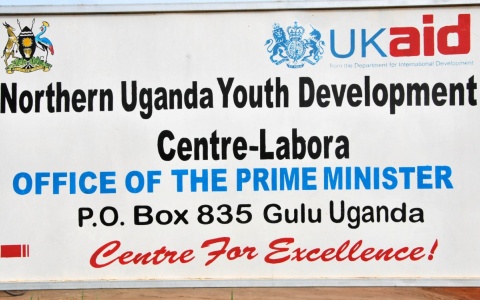
At the Northern Uganda Youth Development Centre (NUYDC), just outside Gulu town, Patrick Odokonyero laments a life that has suddenly gone into reverse.
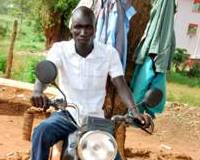 A former internally displaced refugee, Odokonyero had been training in electrical installation at the NUYDC, but the centre has been closed since last December, and the 26-year-old has reverted to earning a living through riding ‘boda bodas’, East Africa’s ubiquitous motorcycle taxis.
A former internally displaced refugee, Odokonyero had been training in electrical installation at the NUYDC, but the centre has been closed since last December, and the 26-year-old has reverted to earning a living through riding ‘boda bodas’, East Africa’s ubiquitous motorcycle taxis.
‘In 2011 I decided to join NUYD for an electrical installation course for a better future. But my dream did not come true when the centre again got closed due to corruption scandal,’ he says.
Administered by the Office of the Prime Minister [OPM] and funded by UKAID, the centre was opened in 2007 by Secretary General Kamalesh Sharma during the Commonwealth Heads of Government Meeting in Kampala, to offer skills training to youth in carpentry and joinery, catering and home management, tourism, tailoring and garment cutting, electrical installation, agriculture, as well as building and concrete practice.
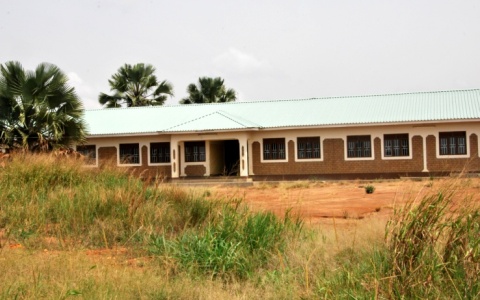
By the time of its closure last December, NUYDC and its 42 outreach centres located over the wide expanse of Northern Uganda from the western border with Congo to the Kenyan boundary in the east had an enrolment of 20,000 youth.
All these, like Odokonyero, are now redundant, uncertain when or even whether the centre will re-open.
Odokonyero speaks for his peers when he says, ‘The corrupt people in the OPM who caused us this suffering should be brought to book and face the law. Because now they have ruined our future, the first term is ending when we are at home and not school.’
Odokonyero, who hails from a polygamous family in Atiak, scene of the 1995 massacre when Kony murdered hundreds of civilians in one of the insurgency’s worst orgies of bloodletting, fled to Gulu as a 13 year-old in 2000, enrolling in primary school before sitting his O’ Levels in 2007.
‘While at NUYDC I would still ride my boda boda on weekends and holidays to raise money to pay some extra fees of sh32,500 ($15) at the centre, and feed my sick sister at home. And when the centre failed to re-open I persistently rode to there to find out when it will re-open, but they tell us to be patient and wait for radio announcements.’
Odokonyero’s experience is just one example of how the despair is slowly but steadily returning to Northern Uganda.
Embezzlement
After many steps forward with five years of fast-paced rebuilding following the defeat of the LRA, the return of displaced persons, and the return of normalcy, suddenly the region has taken a big step back as financial assistance trickles to a halt.
Uganda needs a national debate to reconcile its various ethnic tensions that have affected development and national unity, Northern Uganda leaders say.
Civic and political leaders at a regional conference, ‘Beyond Juba – Uganda at 50: Unfinished Business’, in Gulu, the capital of Northern Uganda, March 18, heard Norbert Mao, leader of the opposition Democratic Party, and a former district chairman of Gulu, plead for the country to hold a national debate on reconciling the different tribes, in the wake of calls from some quarters for the marginalised region to break away.
Northern Uganda is still recovering from 20 years of conflict, from the insurgency of Joseph Kony’s Lord’s Resistance Army. Kony was flushed out of Uganda in 2005, after a huge media and capacity building campaign spearheaded by Ugandan and UK churches which eventually mobilised the EU and the UN.
The Ugandan wing of the insurgency effectively ended, following the breakdown of peace talks in Juba, South Sudan.
Recent calls to secede follow widespread disillusionment caused by an embezzlement scandal of reconstruction funds for Northern Uganda that culminated in the freezing of aid by nine international donors.
The nine members of the Joint Budget Support Development Partners – the World Bank, the European Union, Austria, Belgium, Denmark, Germany, Ireland, Sweden, and the United Kingdom – withdrew $300million in budget support late last year following the theft of $24million in rehabilitation funds for Northern Uganda by officials in the Office of the Prime Minister.
The effects of the embezzlement and the aid freeze have already started being felt.
Nothing brings home the setback more than the sudden state of disrepair than the otherwise magnificent and well-equipped structure of the Youth Development Centre. The centre’s director Anthony Watua says 49 staff of the NUYDC and 90 community facilitators have not been paid for the last four months, and that some contractors and suppliers are demanding hundreds of thousands of dollars for food, training materials and other supplies delivered last year.
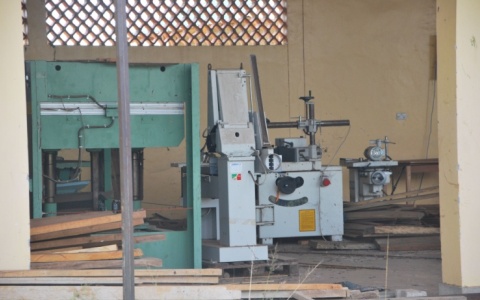
A Parliamentary investigation and a police probe have since been instituted into the embezzlement, but critics say that it is not robust enough, and are sceptical about the eventual outcome, especially since some people seen to be complicit have been handled rather lightly.
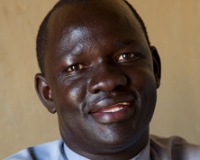 ‘We do not know who is handling this thing,’ says Willy Akena, the Communications Director for the Anglican Church of Uganda’s Gulu Diocese, which covers the key arena of 20 years of LRA rebel insurgency.
‘We do not know who is handling this thing,’ says Willy Akena, the Communications Director for the Anglican Church of Uganda’s Gulu Diocese, which covers the key arena of 20 years of LRA rebel insurgency.
‘There is no independent person handling (the investigation). It is the same people who stole the money, so it may not be addressed fairly.’
Two senior clergymen are less equivocal: ‘Pay back our money’, say John Baptist Odama, the Roman Catholic former archbishop of Gulu, and Benjamin Ojwang, the Anglican bishop of Kitgum, another war-ravaged district of Acholi.
‘All effort should be used to recover the money which should then be given to the people to uplift them,’ says Odama, who is also head of the Acholi Religious Leaders Peace Initiative, an ecumenical lobby credited with underwriting efforts to pacify northern Uganda from the murderous LRA.
‘I do not think that enough has been done; it is good that Government has committed to recovering the money, but it is urgent.’
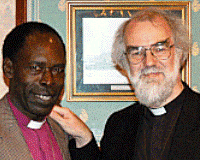 Bishop Ojwang echoes those sentiments: ‘Rich people (government bureaucrats) are benefitting (from foreign aid), yet the poor are suffering. It is all ending in the hands of people who already have much.’
Bishop Ojwang echoes those sentiments: ‘Rich people (government bureaucrats) are benefitting (from foreign aid), yet the poor are suffering. It is all ending in the hands of people who already have much.’
A senior government accountant is facing embezzlement charges in court, while the Prime Minister, John Patrick Amama Mbabazi, and Mrs. Janet Museveni, the First Lady who also serves as minister for Karamoja, a deprived region in Northern Uganda, appeared before Parliament’s Public Accounts Committee last week to defend themselves as the political heads. They both deny any wrongdoing.
Particularly irksome has been the revelation that Mbabazi, appointed as Prime Minister in 2011, when the scam was already underway, had a $150,000 luxury Mercedes Benz vehicle purchased for him from the Peace Recovery & Development Plan (PRDP ) funds budgeted for Northern Uganda.
He has taken a lot of flak for that. ‘This Mercedes Benz must be very comfortable, but that comfort is equal to the pain of the victims of nodding disease in the north; those of us who live with the community share the pain with the people and take note of your luxury,’ charged Christine Abia, a Northern Ugandan MP on the Public Accounts Committee. The Prime Minister has variously denied knowing that the car was purchased from rehabilitation funds.
Two donors – Ireland and Sweden – have, alongside withholding more budget support, since demanded that Uganda refunds the monies stolen from their contribution to PRDP. Ireland has received Euros 4million, while Sweden is expecting back Swedish Kroner 45million.
And how about Northern Uganda? Gulu diocesan spokesman Willy Akena says, ‘Resources that have been given to us by God – whether money or rivers – must be accounted for.
‘When we are given resources we are expected to use them equitably. Do not think only of yourself, but think of others too.’
- Log in to post comments
